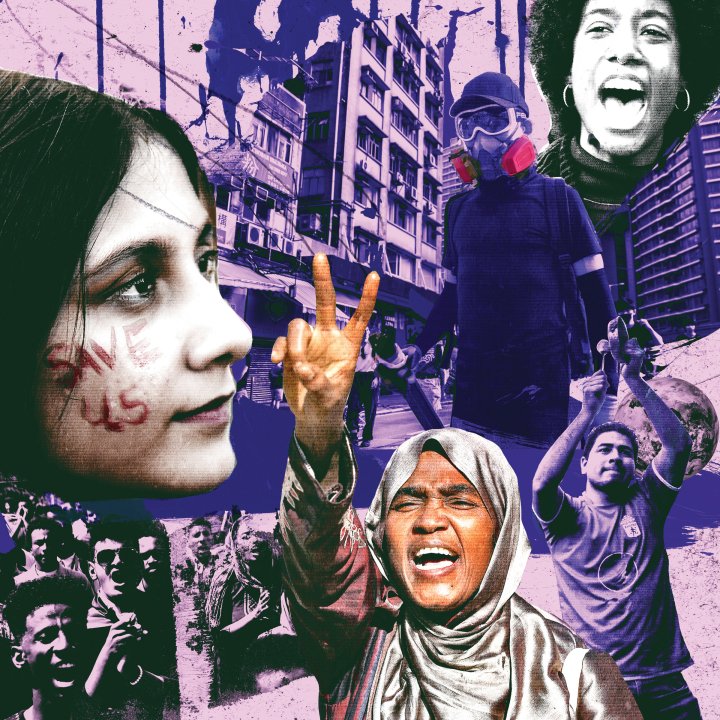In Hong Kong, protesters called for “five demands, not one less.” School strikers around the world warned, “There is no Planet B.” Chileans proclaimed, “It wasn’t a depression, it was just capitalism.” Sudanese called for the downfall of the regime, while the Lebanese complained of “electile dysfunction.”
Over the past year, citizens in Africa, Asia, Europe, Latin America and the Middle East took to the streets to raise their voices against inequality, corruption and bad governance. And while from Italy to Iraq and Venezuela to Zimbabwe they promoted wildly differing slogans, the subtext was always the same: the system is not working. The youth at the forefront of these movements are no longer content to just push for change from the fringes of power. Increasingly they are taking the reins themselves, either through the democratic process or by spearheading protest movements that command the world’s attention.
Countries such as France, Ireland, Austria and Ukraine are turning to younger leaders and new styles of leadership. On Dec. 10, Finland’s Sanna Marin, 34, became the world’s youngest Prime Minister, only to be upstaged a few weeks later by the return of Austria’s Sebastian Kurz, who was sworn in as Chancellor for a second term at the age of 33 on Jan. 7. Kurz and Marin are the latest in a wave of politicians in their 30s winning leadership roles, including New Zealand’s Prime Minister Jacinda Ardern (39), Ukraine’s Prime Minister Oleksiy Honcharuk (35) and El Salvador’s President Nayib Bukele (38).
Read more of TIME's Davos 2020 coverage
These leaders may be young, but their authority is grounded in experience. Many came of age during the 2008 global financial crisis and its aftermath and have experienced firsthand the failure of globalization’s promise to deliver widespread economic prosperity. Social media have exposed unacceptable levels of corruption among economic and political elites, animating demand for change. And this generation of leaders share with their constituents a commitment to make the difficult changes their elders will not—largely because they have the most to lose.
Society is no longer passing the baton to the next in line in a continuing trend of incremental change. We are witnessing a fundamental departure from politics as usual, as these young leaders respond to the demands of even younger activists acutely attuned to the injustices and inequalities of their era. “We grew up around people who have struggled to put food on the table,” Nadia Whittome, who was just elected the U.K.’s youngest parliamentarian at age 23, tells TIME. “We know that the crises we’re up against are huge in scale and that the solutions to them need to be equally bold and implemented urgently.”
What unites these movements is a desire to tear down and rebuild structures built by past generations. In Europe, the experience of postrecession austerity measures has cemented a new commitment to social reforms and greater public spending among the young, and their leaders are following suit. Youth-led protests in Hong Kong, India and Sudan are rebelling against conservative and repressive leadership, while in Iraq and Chile they are demanding an end to corruption. In Lebanon, where anti-government protests drew a quarter of the population to the streets, young protesters have called for a complete overhaul of what they see as a broken political system. Across the Middle East, the outsize hopes engendered by the 2010 Arab Spring uprisings have been shattered by harsh government crackdowns combined with economic stagnation, according to a new survey of Arab youth. “For a generation of young Arabs,” Jihad Azour, director of the IMF’s Middle East and Central Asia department, writes in the survey’s preface, “a decade that began with the promise of change nears its end with tens of millions still longing for peace, prosperity, and the opportunity for a better future.”
The experience of today’s older generations might suggest the young will shift rightward as their stakes in society grow. After all, today’s conservative-voting boomers came of age amid the countercultural revolutions of the 1960s. But today’s youth are unlikely to shed their progressive values over time, according to current research. “Young people now are more socially liberal than young people were in the past,” says Matt Henn, a professor of social research at the U.K.’s Nottingham Trent University. “People’s views on key values such as concerns over the climate emergency, support for investment in public services rather than privatization ... are not necessarily going to dissipate over time. These are fundamental values that, research suggests, broadly stay with people into later life.”
This new generation of young leaders is not exclusively liberal, however. Austria’s Kurz is a conservative, right-leaning nationalist. Yet as head of a coalition that now includes the progressive Green Party, he will have to answer to the demands of younger activists and voters. And they are increasingly impatient for change; today’s youth activists, fearful the time to act is running out, expect progress and delivery on an accelerated time-table. That, even more than their progressive tendencies, is likely to shape policy for years to come, no matter the age of their leaders. —With reporting by Joseph Hincks/Istanbul and Billy Perrigo and Ciara Nugent/London
TIME's Davos 2020 issue was produced in partnership with the World Economic Forum.
















